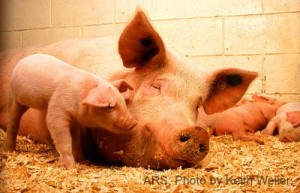Researchers from Johns Hopkins Bloomberg School of Public Health have found an association between living near high-density livestock farms or crop fields where manure is used as fertilizer and community-acquired infections of methicillin-resistant Staphylococcus aureus (MRSA). About 11% of the community-acquired and soft tissue infections can be attributed to crop fields fertilized with swine manure. The research was published in JAMA Internal Medicine.
 One of the problems is that almost 80% of antibiotics used in the U.S. are put into livestock feed. The manure produced by these animals and applied to fields contains antibiotic-resistant bacteria and about 75% of the antibiotics that the animals consumed. An earlier study from the same body found that industrial farm workers carry antibiotic-resistant bacteria, adding to the concern about the sub therapeutic use of antibiotics in farm animals.
One of the problems is that almost 80% of antibiotics used in the U.S. are put into livestock feed. The manure produced by these animals and applied to fields contains antibiotic-resistant bacteria and about 75% of the antibiotics that the animals consumed. An earlier study from the same body found that industrial farm workers carry antibiotic-resistant bacteria, adding to the concern about the sub therapeutic use of antibiotics in farm animals.
The cases that were studied came from 446,000 Pennsylvania residents between 2005 and 2010. There were 1,539 cases of community-associated MRSA and 1,335 cases of health-care-associated MRSA in that population during that time period. There was a “significant association” between community-associated MRSA and swine manure on crop fields, and a similar but weaker association between swine operations and community-associated MRSA.
Joan Casey, lead author of the study, said in a statement, “this is the first study that has linked MRSA infection and skin and soft tissue infections in the community to high-density livestock production. The results require application, but we believe we have provided additional strong evidence that these livestock practices have important public health consequences.”




